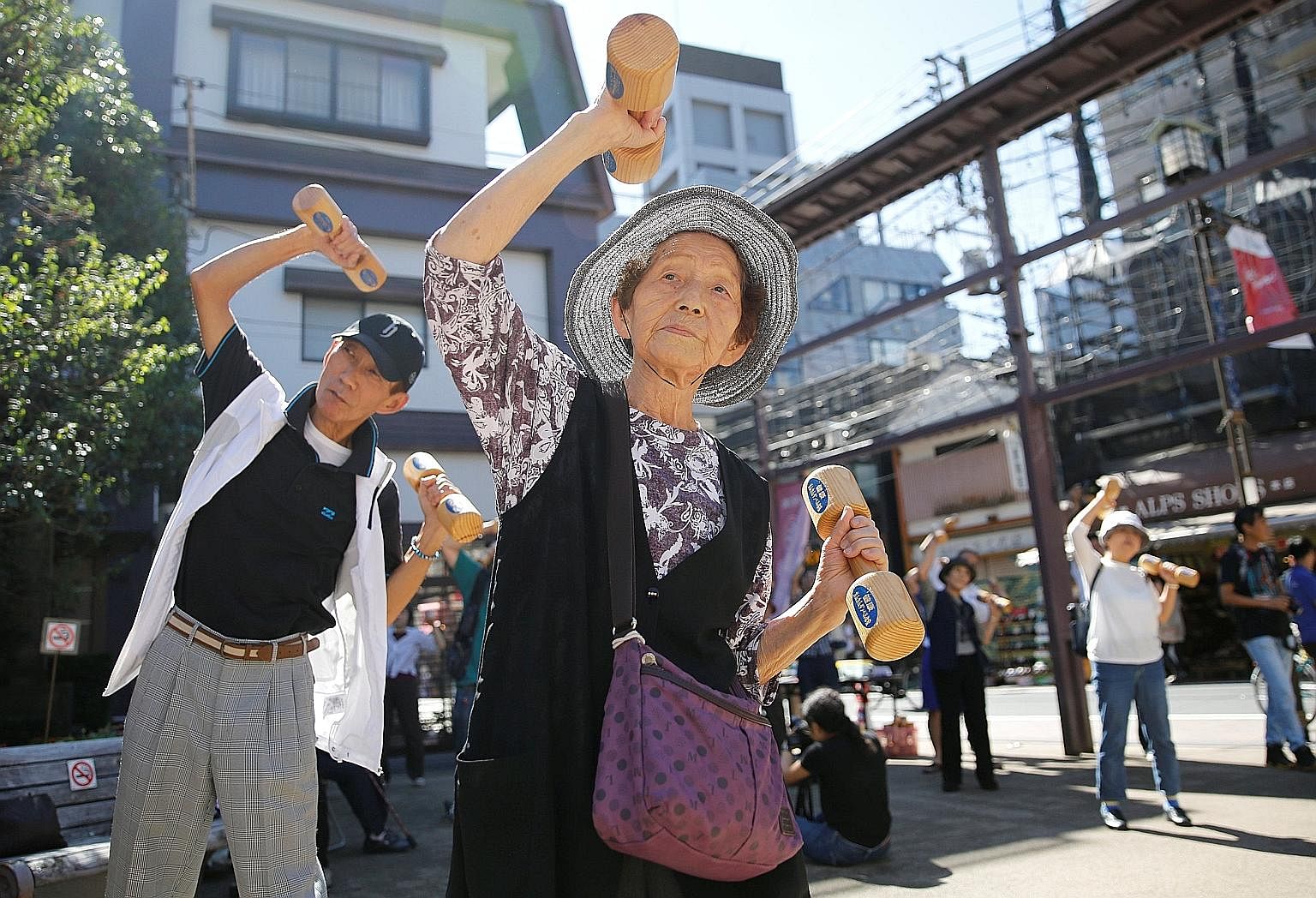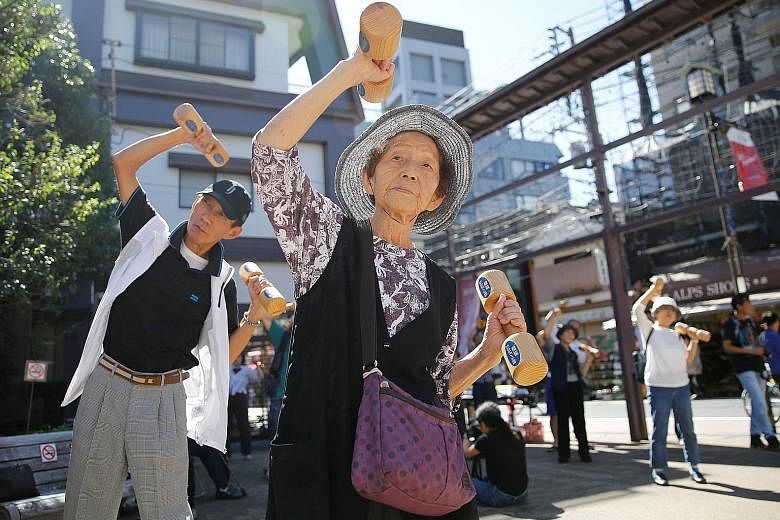Get willing seniors to work longer
Yuta Abe and Naho Osawa
The Yomiuri Shimbun, Japan
The government's plan to allow people to put off receiving pensions until after the age of 70 aims to encourage willing elderly citizens to keep working and stave off a labour shortage.
At a time when the nation cannot afford to put off dealing with its super-ageing society, the government aims to create an environment in which healthy elderly people can continue working.
A draft outline of measures for an elderly society was presented at a joint meeting of the Liberal Democratic Party's First Cabinet Division and the party's Health, Labour and Welfare Division.
"This is the 'era of the 100-year life', and this draft is designed to enable elderly people to live energetic lives, including at work and in social activities," director of the health division Gaku Hashimoto said.
In principle, the current public pension system starts providing benefits to people from the age of 65. However, people can opt to start receiving their pension at any age from 60 to 70. The later a person starts receiving his pension, the higher the amount of the monthly benefit.
For each month the start is pushed back from the age of 65, the monthly payment increases by 0.7 per cent. A person who starts getting a pension from age 66 will receive a monthly payment 8.4 per cent higher than the pension received by someone who starts at age 65.
Delaying the start of one's pension for five years until the age of 70 will result in the monthly payments being 42 per cent higher. The government is considering an even more generous top-up rate for people who decide to start receiving their pension from over the age of 70.
The government's consideration of allowing people to start receiving their pension after they turn 70 stems from a desire to make elderly people a key pillar of the labour market, as the number of young workers is shrinking due to the chronically low birthrate.
Japan's working-age population - people aged from 15 to 64 - was 87 million in 1995, but this number dropped by 10 million in 20 years.
Keeping elderly people in the workforce has become a pressing task.

The work style reforms that are a signature policy of Prime Minister Shinzo Abe's Cabinet also have positioned efforts to encourage elderly people to work as a key issue, along with getting more women into the workforce.
The average life expectancy now exceeds 80 for men and women in Japan, and a growing number of elderly people still want to work.
A Cabinet Office survey found that 40 per cent of people 60 or older wanted to keep working even after they turn 70.
The Japan Gerontological Society and other bodies have started putting forward proposals such as lifting the definition of "elderly people" from the current 65 years to 75. If the appropriate workplace environment and employment conditions can be put in place, the number of elderly people with jobs could increase further.
Into the loving arms of robots
Cai Hong
China Daily, China
People in Japan live longer and stay healthier longer. And an increasing number of aged pensioners live alone.
Japan is on track to soon become the world's first "ultra-aged" country, defined by 28 per cent of a population being over 65. The number of births in Japan fell last year to its lowest since records began in 1899, with about 941,000 new babies, according to Japan's health ministry.
Demand for care services for elderly people has boomed while a shrinking working population means that fewer able-bodied adults are available to look after them. Researchers say to maintain the current population, Japan would have to let in more than half a million immigrants a year. But Japan is also one of the most immigration-resistant nations.
The administration of Japanese Prime Minister Shinzo Abe has insisted it has "no intention" of loosening the country's strict immigration policy.
Resisting immigrants, Japan has turned to automation.
Mr Abe has called for a more rapid development of advanced robotics. He believes that robotics "could help the country overcome the handicap of a fast-ageing populace and a declining workforce at large-scale factories to every corner" of Japanese economy and society.
The Japanese government has already offered substantial subsidies to assist companies that are researching and developing robots, which may solve the scarcity of nurses for the elderly.
Japanese companies aim to create cost-effective robots that will assist the elderly with a range of issues, whether physical or even emotional and psychological.
Japan's Ministry of Economy, Trade and Industry expects the robotic service industry to boom to nearly US$4 billion (S$5 billion) annually by 2035 - 25 times its current level.
Around 5,000 nursing homes across the country are testing robots. They also receive subsidies from the Japanese government.
A study found that using robots encouraged over a third of residents to become more active and autonomous. An ageing population is not just a Japanese problem. What has happened in Japan over the past more than 20 years provides a case study for others, including China.
'80 is the new 60'
Cielito F. Habito
Philippine Daily Inquirer,
The Philippines
For years, it has been fairly common to hear the observation that "60 is the new 40", referring to how 60-year-olds are now much healthier and more active than they were one or two generations ago. In a recent gathering with fellow senior-agers, someone remarked - jokingly, I assume - that the United Nations will soon redefine "youth" to extend to age 60, while "senior age" will begin at age 80. "Middle-aged" will now refer to those who are 60-80, while "elderly" will henceforth supposedly refer to those 90 years old and above.
Maybe all that is still a bit of a stretch, but there's indeed some sense in significantly redefining the threshold ages for being classified as "senior" and "elderly". More and more people are living beyond 80 years, which has made senior citizens much more prominent in the population of the world than in any period of human history. The fastest-growing population segment in the developed world is, in fact, over 80 years old, and because women tend to outlive men, women dominate this age group at a ratio of 2 to 1. There are already serious proposals elsewhere to redefine the age of the "elderly" from 65 to 75 years. A primary motivation for this has been the ballooning costs of social security, especially in ageing societies where retirees are making up a more dominant part of the population.
Abolition of mandatory retirement has been another way that ageing economies facing not only social security pressures but also tight labour markets are dealing with the issue.
The new elderly are reshaping the nature of consumer demands, and today's producers and service providers would do well to take note. The average age of a Porsche buyer is now reportedly 58, the biggest buyers of electric guitars in Japan are over 60, and retired seniors are a brisk market for world travel.
A housing policy for the elderly
K.M. Mo
China Daily (Asia), Hong Kong
It is estimated that by 2047, our senior citizens headcount will reach 2.6 million - one-third of our population.
The press conference held recently by the Hong Kong Institute of Surveyors on elderly housing policy was a timely reminder for us to focus on the special needs of our senior citizens - covering housing, social provisions and medical and rehabilitation services.
Currently, many senior citizens live in homes for the elderly run by NGOs and commercial operators. However, this is far from ideal as most of them prefer ageing in place.
Currently, the Hong Kong Housing Society provides rental housing for aged singletons or couples in three estates equipped with social and medical provisions. The Hong Kong Housing Authority also operates a priority scheme for the aged. It's about time the government reviews the adequacy of the current housing provisions for senior citizens and decides if bold initiatives need to be introduced.
The elderly generally will enjoy a much happier life if they can live with their children and grandchildren. The government should come up with some incentives to encourage our youngsters to live with their elders under the same roof.
With elderly-friendly features in domestic buildings, there are two main issues to consider - what needs to be provided in new buildings and what can be done to upgrade existing ones.
Recommended elderly friendly features within individual flats should include wider doors, easier access to switches and sockets - located at a level reachable by wheelchair users - non-slippery floors, wall-mounted grip bars and the like.
• The View From Asia is a compilation of articles from The Straits Times' media partner, Asia News Network, a grouping of 23 news media.

